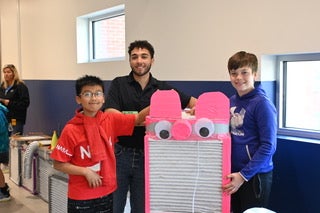UM undergraduate’s air quality initiative at Central wins award
Published 12:03 pm Friday, April 12, 2024

- Dylan Barker, an undergraduate researcher at the University of Mississippi, has been awarded the prestigious Stamps Impact Prize for his innovative initiative aimed at enhancing air quality in educational environments. Photo provided
Dylan Barker, an undergraduate researcher at the University of Mississippi, has been awarded the prestigious Stamps Impact Prize for his innovative initiative aimed at enhancing air quality in educational environments.
The Stamps Impact Prize, funded by the Strive Foundation, supports undergraduate-initiated research projects, creative achievements and community service endeavors.
Barker’s project, which was developed in collaboration with the Pharmacy Administration Department, seeks to address the critical issue of indoor air quality in classrooms. Through an after-school program at the Boys and Girls Club, Barker and his team introduced students to STEM projects and taught them research methods. One of the key projects undertaken is the development of the Corsi-Rosenthal box, designed to demonstrate the impact of environmental factors on health and strategies to mitigate them.
“The Corsi-Rosenthal box is a testament to the power of innovation and collaboration,” said Barker. “It’s affordable, accessible and has the potential to significantly improve air quality in classrooms, ultimately enhancing the learning environment for students.”
The project aims to install Corsi-Rosenthal boxes in 30 classrooms at Central Elementary School, a partnership facilitated by Dr. Nikki Logan, the principal. Barker plans to conduct presentations for fourth and fifth graders at Central in May to educate them about the project’s significance.
“We’re thrilled to collaborate with Dr. Logan and the Oxford community to tackle the issue of indoor air quality,” Barker added. “This project represents the culmination of interdisciplinary efforts, with contributions from the construction, electrical engineering and HVAC classes at Oxford High School’s Center for Applied Engineering.”
In addition to benefiting Central Elementary School, the project has drawn interest from the Center for Applied Engineering at Oxford High School, which is keen on exploring air quality within its premises. The CAE plans to conduct measurements using air quality testers before and after installation to assess the project’s effectiveness.
“By addressing air quality concerns not only in CES classrooms, but also in the Center for Applied Engineering building, we’re contributing to community-driven efforts in public health and environmental awareness,” said engineering teacher Charlie Sabatier.
Sabatier and his team aspire to design a high school version of the Corsi-Rosenthal filter, incorporating advanced features and automation to streamline its implementation.
“We’re committed to continual improvement and expansion,” Barker emphasized. “Our goal is to empower educators and communities with tools to create healthier, more conducive learning environments.”





